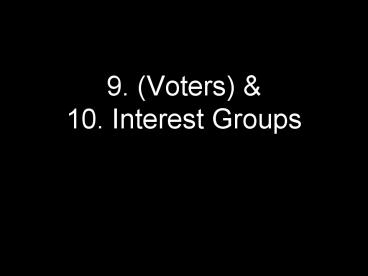9. Voters - PowerPoint PPT Presentation
1 / 27
Title:
9. Voters
Description:
Office-holders elected by a body which has itself been chosen by a ... Weekend polling. Decisiveness. Automatic registration. Referendum, initiative, recall ... – PowerPoint PPT presentation
Number of Views:52
Avg rating:3.0/5.0
Title: 9. Voters
1
9. (Voters) 10. Interest Groups
2
Electoral systemspresidents
- Presidents
- Electoral system
- Three additional features
- Term length
- Is reelection possible?
- Link with other elections
3
Presidents electoral systems
- Election
- - Indirect (or non-elected)
- - Direct
- Plurality
- Majority-runoff
4
Indirect election
- Office-holders elected by a body which has itself
been chosen by a wider constituency - Examples US president, upper houses of
parliament in many countries also, US Senate in
the past
5
Presidents additional features
- Term length typically no less, often longer,
than legislature (up to 7 years) - Reelection possible? Term limits lame duck
effect - Timing coattails
6
Voting behavior
- Why do voters vote the way they do?
- We see a decline of cleavage politics, rise of
issue voting - Cleavage politics voting as act of affirmation
rather than choice
7
Party identification model (Michigan ,
socialization )
- Voting - expression of loyalty, deep-seated
long-lasting commitment - Result of socialization process
8
Socialization party ID
- Family
- ? (reinforcement)
- Social groups
- ?
- Party identification
9
Party identification(Europe group
identification)
- Long-term attachment to a particular party,
anchoring voters political views - Related to, but separate from, electoral choice
10
Decline of cleavage (class) voting(party
identification)
- Symptoms/consequences
- decline in party identification
- falling turnout
- increased volatility
- emergence of new parties
11
Partisan dealignment
- Weakening of ties
- voters ? political parties
- social groups ? political parties
- Causes
- political disillusionment
- social/economic changes
12
Electoral alignment changethree scenarios
- Dealignment weakening links
- Non-alignment dissapearance of links
- Realignment new links
13
Dealignment how do voters choose now?
- Retrospective voting (Fiorina) what has the
government done for me lately?
14
Declining turnout why?
- Two general factors
- - declining satisfaction with government
performance - success in resolving the capital-labor
conflict (growth of the welfare state)
15
Cross-national variations in turnout
cost/benefit analysis
- Features of the electoral system
- Compulsory voting
- Proportionality
- Postal voting
- Weekend polling
- Decisiveness
- Automatic registration
16
Referendum, initiative, recall
- Increased turnout individual features
- - Age, party loyalty, education, income (direct
effect) - - Church attendance, belongs to union (influence
of environment)
17
Referendum, initiative, recall
- Referendum referred to people (initiated from
above) - Initiative (from below) initiate a referendum
- Recall voters demand a referendum to remove an
official
18
Elections in new democracies
- Founding election vs. second election
- Too much of a good thing?
- Too few (one party, no parties) is a serious
problem - How about too many parties?
19
Example Ukraine 2002
- If you are a left-wing voter
- Not much choice in a country like the US (Greens?
Democrats?) - Things slightly better in France (Socialists,
Communists, Greens) - Ukraine?
20
Youre a Communist voter
- The Communist Party of Ukraine
- The Communist Party of Ukraine (Renewed)
- The Communist Party of Workers and Villagers
21
Working-class union member
- Choose between
- Workers Ukraine
- Working Ukraine
22
A Socialist voter
- You also have a choice
- The Socialist Party
- The Progressive Socialist Party
23
If you like Social-Democrats
- The Social Democratic Party of Ukraine
- The Social Democratic Party of Ukraine (United)
- Ukrainian Social Democratic Party
- The Social Democratic Union
24
For nationalist voters
- The Popular Movement of Ukraine
- The bloc Popular Movement of Ukraine
- The Ukrainian Popular Movement
25
Elections in authoritarian states
- Q How were elections called under Communism?
- Only one party to choose from
- Often, one candidate to choose from
- A elections Paradise-style
- God to Adam
- Here is Eve, the woman of your choice
26
Exercise Duverger vs. Rokkan
- Duverger (institutionalist)
- electoral system ? party system
- Effects
- mechanical
- psychological
27
Rokkan sociological approach
- Society/social diversity
- ?
- Party system
- ?
- Electoral system




























![❤️[READ]✔️ Women in the American Political System: An Encyclopedia of Women as Voters, Candidate PowerPoint PPT Presentation](https://s3.amazonaws.com/images.powershow.com/10047873.th0.jpg?_=20240605039)
![❤️[READ]✔️ Women in the American Political System: An Encyclopedia of Women as Voters, Candidate PowerPoint PPT Presentation](https://s3.amazonaws.com/images.powershow.com/10048518.th0.jpg?_=202406051112)
![❤[READ]❤ The Primary Rules: Parties, Voters, and Presidential Nominations PowerPoint PPT Presentation](https://s3.amazonaws.com/images.powershow.com/10050521.th0.jpg?_=202406071210)
